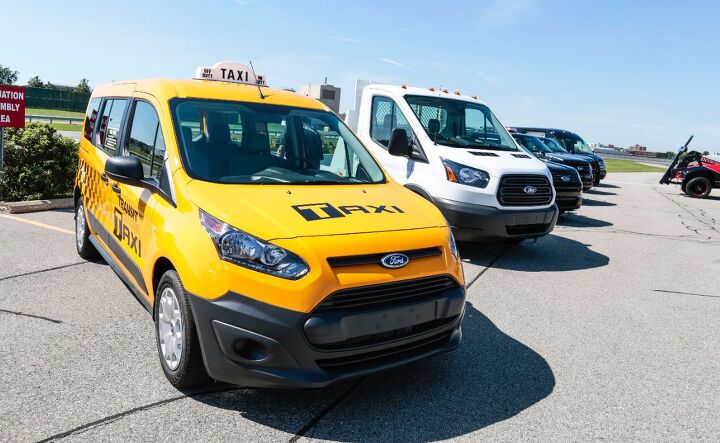Ford to Become Captain of the Fleet as GM Shies Away

With nearly a third of its volume heading to businesses and government agencies, Ford is a bit of a fleet queen. However, the Blue Oval has been fairly uniform with General Motors in terms of volume when it came to selling its vehicles in bulk.
Not so this year.
General Motors is gradually pulling back from fleet sales, leaving FCA and Ford with a larger piece of the pie. GM’s total U.S. sales in November were up more than 10 percent from the previous year, giving it a larger share of the retail market and the confidence to abandon some of its fleet dependance. Meanwhile, Ford’s seems happy staying the course so long as the endeavor remains vaguely profitable.
“We don’t see an adjustment necessary in the daily rental,” Ford’s president of the Americas, Joe Hinrichs, told Automotive News. “We think where we’re at is pretty good and pretty balanced.”
Balanced is the operative word here. While Ford’s November fleet sales slipped a bit from 2015, total fleet volume is up 2 percent overall for the entire year. The government’s love affair with the Taurus and the commercial success of its vans and F-Series trucks is well-known, and those are some of the biggest contributing factors to that growth. Fleet vehicles now make up 30 percent of Ford’s volume, well above the 19 percent average for other major automakers.
“The rest of our fleet business is very healthy, and we’re growing it; we don’t see a reduction coming,” Hinrichs said.
Meanwhile, General Motors reduced sales to rental companies by 75,000 units in 2016, and wants to trim its fleet offerings even further next year. The theory is that GM can earn more by focusing more on retail and won’t suffer quite so egregiously the next time there is an economic downturn. FCA, which has long vowed to trim its fleet sales, made progress on that goal in October.
“Rental business isn’t bad business,” GM’s president of North America Alan Batey told AN last month. “But we don’t need to do it to run plants anymore, and it puts pressure on resale values.”
However, Ford isn’t going overboard with rental sales either. While it says it’s comfortable with its current fleet size, it hasn’t let rental volume balloon anywhere close to pre-recession numbers. Ford’s leadership understands that individual customer sales are more lucrative but it doesn’t seem keen to abandon what it has.
“Retail sales by their very nature tend to be [more profitable],” said Stephen Odell, Ford’s executive vice president of global marketing, sales and service. “Clearly, we wouldn’t participate if it didn’t make financial sense for us.”
“It’s all in balance, of course,” Hinrichs told Automotive News. “The daily rental business is very different than it was 10 years ago when we had a lot more volume and more pronounced on one or two nameplates. Now, we’re pretty balanced at a lot lower volume.”
[Image: Ford Motor Company]

A staunch consumer advocate tracking industry trends and regulation. Before joining TTAC, Matt spent a decade working for marketing and research firms based in NYC. Clients included several of the world’s largest automakers, global tire brands, and aftermarket part suppliers. Dissatisfied with the corporate world and resentful of having to wear suits everyday, he pivoted to writing about cars. Since then, that man has become an ardent supporter of the right-to-repair movement, been interviewed on the auto industry by national radio broadcasts, driven more rental cars than anyone ever should, participated in amateur rallying events, and received the requisite minimum training as sanctioned by the SCCA. Handy with a wrench, Matt grew up surrounded by Detroit auto workers and managed to get a pizza delivery job before he was legally eligible. He later found himself driving box trucks through Manhattan, guaranteeing future sympathy for actual truckers. He continues to conduct research pertaining to the automotive sector as an independent contractor and has since moved back to his native Michigan, closer to where the cars are born. A contrarian, Matt claims to prefer understeer — stating that front and all-wheel drive vehicles cater best to his driving style.
More by Matt Posky
Latest Car Reviews
Read moreLatest Product Reviews
Read moreRecent Comments
- CanadaCraig My 2006 300C SRT8 weighs 4,100 lbs. The all-new 2024 Dodge Charge EV weighs 5,800 lbs. Would it not be fair to assume that in an accident the vehicles these new Chargers hit will suffer more damage? And perhaps kill more people?
- Akila Hello Everyone, I found your blog very informative. If you want to know more about [url=
- Michael Gallagher I agree to a certain extent but I go back to the car SUV transition. People began to buy SUVs because they were supposedly safer because of their larger size when pitted against a regular car. As more SUVs crowded the road that safety advantage began to dwindle as it became more likely to hit an equally sized SUV. Now there is no safety advantage at all.
- Probert The new EV9 is even bigger - a true monument of a personal transportation device. Not my thing, but credit where credit is due - impressive. The interior is bigger than my house and much nicer with 2 rows of lounge seats and 3rd for the plebes. 0-60 in 4.5 seconds, around 300miles of range, and an e-mpg of 80 (90 for the 2wd). What a world.
- Ajla "Like showroom" is a lame description but he seems negotiable on the price and at least from what the two pictures show I've dealt with worse. But, I'm not interested in something with the Devil's configuration.


































Comments
Join the conversation
So long as there is a profit, it's all good.
This is mostly tongue-in-cheek, but as the most "American" car company, does it only make sense that Ford has the highest fleet sales, in the way that Toyota makes cars that only serve the domestic market, like the Century?